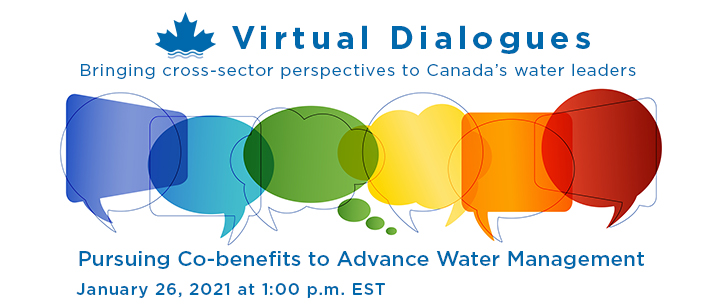

Pursuing Co-benefits to Advance Water Management
January 26, 2021 @ 1:00 pm - 2:30 pm
Despite the future uncertainty of climate change, emerging contaminants, regulatory changes and unforeseen challenges like the COVID-19 pandemic, operational decisions in water, wastewater and stormwater management need to be made. Creative approaches that yield social, environmental, governance, economic and technology co-benefits are gaining momentum, but require the cross-functional, integrated collaboration of multiple departments, sectors or organizations. Efforts to realize co-benefits can build resilience across the water sector in the face of uncertainty ― now and into the future.
Join us as we push the limits of online events with our CWN Virtual Dialogues. Thought leaders will discuss co-benefits success stories, lessons learned and approaches to working across community silos. Moderator Sandra Cooke, Director of the Canadian Municipal Water Consortium, will deliberately leave additional “chairs” open on the panel so that participants with access to a microphone and camera can contribute to the dialogue as it unfolds.
Who should attend this virtual dialogue?
Utility and municipal decision-makers, knowledge and solution providers, government champions.
Please register to attend this event.
A background document has been prepared for the virtual dialogue.
About the Speakers
Jimmy Zammar is Director of Integrated Strategy and Utility Planning in Engineering Services at the City of Vancouver, where he leads the One Water group, which aims to integrate the city’s planning for water, sewer and drainage while incorporating climate adaptation, green infrastructure and data driven, multi-criteria decision-making. Jimmy also leads the city’s low-carbon district heating utility. Previously, his responsibilities at KPMG, AECOM and DAI included major project planning, capital program management and strategic asset management for public agencies in the water, wastewater, green building and clean energy sectors. Jimmy holds graduate degrees in architecture and building engineering, infrastructure project management and sustainable development.
Robert Newell, PhD, is Associate Director of the Food and Agriculture Institute at the University of the Fraser Valley and previously Adjunct Professor at the School of Environment and Sustainability at Royal Roads University. His research explores the use of systems thinking, models and visualizations as tools for supporting local planning and decision-making. Much of his work has looked at community climate action in an integrated planning context, and he has explored a number of different analyses and techniques for supporting local climate action efforts, such as decomposition analysis and mapping climate action co-benefits. Robert develops tools for facilitating more inclusive, collaborative approaches to planning, including game development software to build realistic visualizations for participatory planning and community engagement.
Victoria Kramkowski is the Government and Community Relations Specialist with Toronto and Region Conservation Authority (TRCA), where she advances the organizations’s strategic goals through engagement with governments, community groups, and other organizations and stakeholders. Victoria previously managed the City of Mississauga’s award-winning stormwater charge program, including associated outreach, credit and incentive programs, and has worked with municipalities across Canada in the development of their stormwater charges. She’s also worked in government, the private sector and academia on environmental policy, natural resources management, low impact development and scenario planning. Victoria has a PhD in Environmental Planning from York University.

